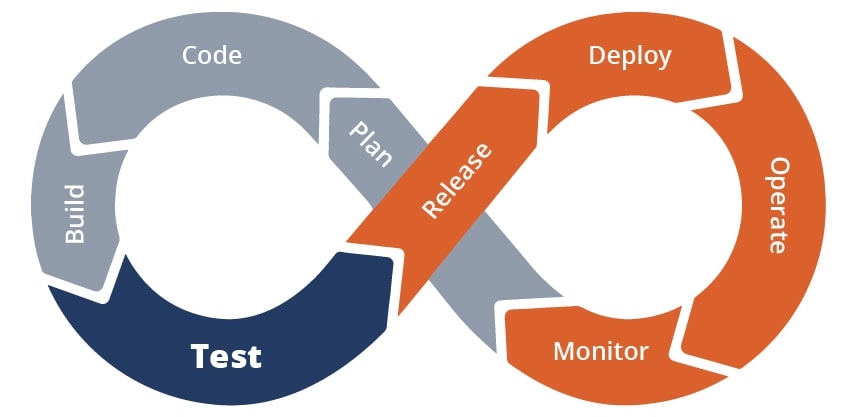- QATestLab Blog >
- Automated Testing >
- Automated Testing in DevOps: Whys and Wherefores
Automated Testing in DevOps: Whys and Wherefores

Note: this article was updated in September 2019.
What’s DevOps and who are DevOps engineers? Why their and Quality Assurance engineers’ job combination is like mustard and ketchup: a hot dog is bad without sauces as a project without these experts. But why? This article will reveal all the truth about DevOps engineers and the methodology they use.
What is DevOps?
DevOps is the professional flow that supports a joint relationship between developers and the IT department. As a result, we get faster progress in the project accomplishment. This methodology gives balance, increasing reliability, and security in production. So, there are three business benefits that organizations gain from switching to DevOps:
- faster market entry (e.g., faster time cycles and faster deployment);
- better quality (e.g., increased availability, fewer crashes, etc.);
- increased organizational efficiency (for example, more time to increase the product’s value or extend the functionality).
DevOps Methodology
Let’s take a look at the DevOps Process before you get with the DevOps Cycle:
 It was created to make work on the project more efficient. All these blocks of DevOps have different goals and requirements of skills. In DevOps, experts are using principles of the Agile methodology. It helps developers and project teams to work more effectively. Initially, the followers were mostly small startups who wanted to hit the market and go through cut and try. The developers are now able to produce functional code faster. After the product is created and released, the development team formally is no longer responsible for it and starts another work.
It was created to make work on the project more efficient. All these blocks of DevOps have different goals and requirements of skills. In DevOps, experts are using principles of the Agile methodology. It helps developers and project teams to work more effectively. Initially, the followers were mostly small startups who wanted to hit the market and go through cut and try. The developers are now able to produce functional code faster. After the product is created and released, the development team formally is no longer responsible for it and starts another work.
On the other hand, the DevOps technique is aimed at taking ready-made software and deploying it in the safest and reliable way. Agile’s requirements and solutions are making an increase because of cooperation between teams that are capable to self-organize. In the end, it has brought new processes in technology that streamline and automate the whole SDLC: the acceptance of continuous integration (CI) and the adoption of frequent code checking.
DevOps Cycle
After the introduction of DevOps methodologies, the value, and importance of the QA increase. Because without passing the test – demo is impossible:

Let’s take a closer look at each element of the loop.
Plan: make sure you have a clear picture of the product you want to get. Formalize the requirements in a plan that will guide the project team in the future.
Code: the project code should be as per customer requirement according to the plan you prepared at the first stage.
Build: here the application is built by integrating different codes that you developed before.
Test: check the product you have created so far. The revealed bugs should be fixed before the app’s release.
Releases: after a successful accomplishment of the testing stage, you are free to release the final version of your application.
Deploy: deploy your code in the cloud for future reference. It should be done in a way that none of the changes made affected the operation of a site with high traffic.
Operate: complete the operation with the code.
Monitor: control the app’s performance according to customer requirements and make changes if necessary.
What is the role of QA in DevOps process?
Quality Assurance engineers give the project invincible result that brings it to the success with quality and perfection, and here’s why:

One of the priorities in the developers’ job is to reach its DevOps goal: deliver as many features requested by clients as possible. And when they are done, they pass the product to testers. Then the task for the tester would be to find all bugs. After it, the issues are solved (and by “issues” we meant all disagreements among those two clans of Development and Quality Assurance), testers pass the product with no issues for the Operational team.
Their job is to achieve the limit of changes in the system. Well, they can forget about the problems in the code and system will crash… As for the QATestLab team, it performs an excellent job, and none Dev, none Ops stay on working until midnight. DevOps QA has experience and a great background. The center of Testing in DevOps belongs to automated tests. Then goes the experienced team, the pure code, and the continuous delivery.
Why Integrating Automated Testing in DevOps Is a Noteworthy Idea?
There are several reasons why you should consider applying automation testing at a project that is run according to the DevOps principles:
- Improvement in quality
- Time savings
- Cost savings
A human factor is determining in manual testing. If a software tester gets distracted by something or simply has a bad day, missed bugs are inevitable. In their turn, automated test scripts cannot demonstrate the creativity inherent to a human being, but they never get tired or distracted and fulfill their mission rather unmistakably.
DevOps team can get stuck in the manual testing cycle for weeks. With test automation, it is possible to save time that can be further spent on creative tasks, not on finding trivial software flaws. Automated testing allows quickly checking the software for crucial bugs immediately after it’s been developed by a programmer. This saves money and allows users to receive a working product in a shorter period.
Deploy groups have been divided into departments: network and database. The operating system “traveling destination” got both of these groups. A problem may occur when these groups start to struggle alone:
- The Development part sometimes doesn’t care about Quality Assurance and the Operation team’s goals.
- Quality Assurance and Operation teams have one thing in common: usually, they want all features to fit in the project but have no reference to the client’s business goals and software values.
- All departments have different tasks without communication between them, and it can be the reason for the disorganization when everyone just points fingers when something isn’t working.
Summing Up the DevOps Methodology
Mike Orzen (the author of “Lean IT“) once talked about the huge losses in the IT stream caused by long periods of downtime, slow transfer of work, unplanned work and alterations. For this article, we estimated how much useful work we could return by applying DevOps principles. We hope that it was a useful write-up to understand the value and responsibilities of DevOps and QA teams with the reference to automation testing. To know more, check out our blog.
Learn more from QATestLab
Related Posts:
- When Does Your Project Need Test Automation?
- Software Test Automation: Problems and Tips
- How to Choose a Tool for Automated Testing?
About Article Author
view more articles






No Comments Yet!
You can be the one to start a conversation.